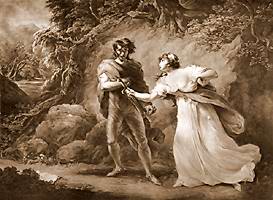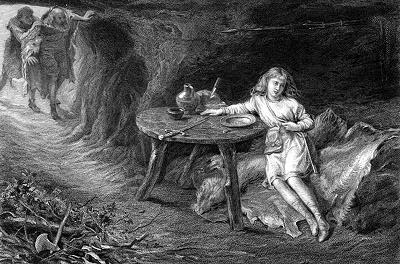
ACT III
SCENE i
Cymbeline asks Caius Lucius, a representative of the Roman emperor, what business he is on for Augustus Caesar. Mention of Cassibelan, instead of the customary Cassivellaunus, points to the influence of Golding in Caesar's Commentaries (Ogburn and Ogburn 157). "Barrell notes that the Roman general Lucius ... speaks to the British leader of 'thine uncle, -- famous in Caesar's praises,' suggesting that Oxford was cleverly referring to his own uncle and his composition," Golding's The eyght bookes of Caius Julius Caesar (Prechter 13). [See Robert Prechter, "A Deeper Look at the Arthur Golding Canon." Shakespeare Matters 7.1 (Fall 2007): 7-14.] If the play allegorizes relations between Britain and Spain in 1578, then "change Augustus to Philip and Caius Lucius to Mendoza, change Gallia to the Low Countries, and consider the 'legions in Gallia' as the Spanish troops there in 1578" (Clark 90).
Lucius recounts that when Julius Caesar conquered Britain, Cymbeline's uncle granted an annual three thousand pound tribute, which Cymbeline has been remiss in coughing up lately. [(III.i.24): "I have invented a rather lame translation of my own to catch the alliteration as well: 'Went, watched, won'" (Asimov 64).] The Queen and Cloten are scornful, the former noting that Caesar did not have as easy a time as implied and the latter that Britain is stronger now while Rome is weaker. Cymbeline also, but more diplomatically, announces the end of the tribute from the now "warlike" Britain (III.i.52). Lucius is sorry to say that it means that Britain is Rome's enemy and will suffer "war and confusion" (III.i 65). So that's settled; now Lucius may kick back and enjoy their company for a few days.
That Caesar has more kingdoms than servants is allegorically applicable to Philip II of Spain's sovereignty over the Netherlands, Naples, Sicily, Milan, Portugal, Mexico, the West Indies, much of South America (Clark 91). "Philip had under his sovereignty at this time, besides Spain, the Netherlands, Naples, Sicily, Milan, and a large part of South America. A year later he had Portugal. The word 'fury' is of course used with intent, recalling the Spanish Fury of November 1576.... The English nation had been horrified by the massacre" (Ogburn and Ogburn 155). The scene may also contain a reference to Philip's kindness to Elizabeth (III.i.70f) when he was married to her half-sister Mary (Ogburn and Ogburn 155).
SCENE ii
Pisanio reads a letter from Posthumus and is distraught, asking, "O master, what a strange infection / Is fall'n into thy ear!" (III.ii.3-4). Pisanio insists on Imogen's virtue, but reveals that the letter instructs him to kill her. Imogen enters, interested that the letter is from Posthumus. She reads a portion, but it's a portion that mentions his current whereabouts so that she can exude about her determination to fly to him. Regarding Imogen's eloquence (III.ii.49f), "who could hear this without loving the speaker?" (Bloom 624). She will meet him at Milford-Haven in Wales. The harbor of Milford-Haven really refers to Long Melford near London where Elizabeth received French envoys of Alençon in 1578 (Clark 91). Similarly, Cambria may refer to Cambridge (Clark 92) where Elizabeth visited also on progress in 1578.
SCENE iii
In Wales (and coincidentally near Milford-Haven), Belarius, who was banished from the British court years ago and adopted the name Morgan, lives with his two foster sons, Polydor and Cadwal, who are really Guiderius and Arviragus -- the long lost sons of Cymbeline -- and don't know it; "the two boys are temperamental and emblematic opposites: Guiderius exemplifies the active ideal, and Arviragus the contemplative" (Garber 811). As indicated (III.iii.35f) the depiction of the "younger brother Cadwal is more poignant as he de-idealizes the hunter's life" (Bloom 625). Belarius praises the simple country life as opposed to the backstabbing world of the court, and the sons complain that they have no means of comparison. But Belarius mentions that he because of treachery he was stripped of his lands and title. Belarius seems to be another depiction of the banished Oxford (esp. III.iii.55-69) (Ogburn and Ogburn 295, 962), added to the plot, along with the storm and the robbery in the 1580s (Ogburn and Ogburn 327). If Belarius and the boys are part of a later revision, the boys were originally gotten out of the way for the sake of focus (Ogburn and Ogburn 155). Regarding one flashback (III.iii.29f), "The image of the confined debtor is a dark one for a king's son, and has the poignance here of a changeling's fantasy that is no fantasy" (Bloom 624). Belarius privately reveals that he stole Cymbeline's sons in vengeance, came to love them, and married their nurse Euriphile to create for them the illusion of a birth family. The boys are displaying their princely qualities these days, and daily honor the grave of their foster-mother Euriphile.
The "plot complexities, luxuriantly crowded from now to the end, are themselves a parody" (Bloom 626).
SCENE iv

|
At Milford-Haven, Imogen wants to see Posthumus, but Pisanio thinks this
is a bad idea and shows her the rest of that letter from him -- the part
calling her a proven "strumpet" (III.iv.22) and commanding her execution.
Pisanio laments that the slander is worse than death. Imogen doesn't
understand how she has been false to Posthumus. She wants to die and
encourages Pisanio to carry out the slaying, since suicide is a sin.
Pisanio refuses to kill her. He's convinced someone has lied to
Posthumus. Instead, Pisanio will notify Posthumus of her death. She
refuses to return to the British court with Cloten there, so she'll stay
in the forest. Imogen's speech (III.iv.74ff) gives a poignant picture of
Anne [Cecil] keeping a Greek Testament her husband had sent her next her
heart" (Ogburn and Ogburn 156).
|
Pisanio suggests she disguise herself as a boy and enter the service of Lucius where she may be able to find out more about what happened with Posthumus. He gives her the supposed medicine / supposed poison / sleeping potion that he got from the Queen who got it from the physician. "Again a container, supposed to enclose something miraculous and beneficial, is opened in the presence of Imogen, and again what is in it almost destroys her" (Garber 823). "The scene has no more psychological verisimilitude than an episode from Snow White, which it resembles, but its faux-naivety is sophisticated rather than simple-minded" (Wells 353).
SCENE v
Cymbeline grants Caius Lucius safe-conduct to Wales and they anticipate war but behave in a civilized fashion. Cymbeline is disturbed that he hasn't seen Imogen for a while. The Queen feigns compassion for Imogen's grief over Posthumus. A servant reports that Imogen's door is locked and there's no answer, so Cymbeline and Cloten go to find out what has happened. The Queen figures that if Imogen ran away to be with Posthumus, she'll be banished or dead so that Cloten can inherit the throne.
Cloten returns, reports Imogen fled, and says Cymbeline is fuming. Pisanio enters and Cloten demands he reveal Imogen's whereabouts. Pisanio presents the letter from Posthumus to shed some light on the matter. Cloten reads it and commands Pisanio to serve him. Pisanio pretends that he will. Cloten sends him to fetch some of Posthumus' clothes. Cloten's subsequent soliloquy reveals that will go to Milford-Haven to kill Posthumus. He recalls that Imogen "said upon a time (the bitterness of it I now belch from my heart) that she held the very garment of Posthumus in more respect than my noble and natural person" (III.v.133-136). Cloten plans to don Posthumus' clothes, go to Milford-Haven, kill Posthumus in front of Imogen, then rape her while wearing the clothes she praised, and kick her all the way back to court.
|
SCENE vi Imogen in boy's clothes is exhausted, having slept on the ground for two nights now. She finds the crude cave-home of Belarius and the two brothers. Soon they return and find "an angel! or if not, / An earthly paragon!" eating (III.vi.42-43). Imogen offers money but it has no meaning to them. She introduces herself as "Fidele" and says she is trying to find her kinsman Caius Lucius. They welcome her wholeheartedly, even though they recognize that she seems a bit troubled about something. "Certainly the boys are born, or reborn, from this cave, whether we want to call it a 'womb' or not" (Garber 823). SCENE vii Roman senators report the Emperor's writ to some tribunes. With so many other wars going on, Caius Lucius himself has been appointed proconsul and leader of the army against Britain in the coming war. |

|